May 26, 2021
This year’s Spanish reissue of El Cáliz y La Espada has lead to an outpour of interest and passion for Dr. Riane Eisler international bestseller. Three decades after its first print Spanish edition, El Cáliz y La Espada is inspiring an entire new generation of Spanish readers in Spain and Colombia. Dr.Eisler’s book may be thirty years old, but it continues to show that it was ahead of its time.
El Cáliz Y La Espada has excited a curiosity in Spanish readers and Spanish journalists alike. Below are highlights from Dr.Eisler’s interviews with Spanish publications.
El Confidencial
In an interview with El Confidencial, an independent online newspaper based in Spain, Dr.Riane Eisler talks with Marta Medina about the changes that have occurred in the world since ‘The Chalice and The Blade’s’ first edition. Their discussion was published in an El Confidencial article titled, “Riane Eisler huyó del Holocausto para revolucionar la historia: “Cambiemos el relato masculino” or Riane Eisler fled the Holocaust to revolutionize history: “Let’s change the masculine story”.
Read the entire article in Spanish here.
Spanish Vogue
Spanish Vogue recently featured El Cáliz y La Espada as one of three books to read that they didn’t teach you in school. The article titled, “Tres libros de historia muy interesantes sobre cosas que no diste en el colegio” or “Three interesting history books about things they don’t teach you in school”.
“This book imagines models of culture unthinkable from our present: some based on collaboration instead of domination. Eisler moves to pre-triarchal cultures to think –based on archaeological, anthropological and historical evidence– about societies that do not articulate their roles in the binary of the sexes, and that have prompted readers to think about possible ways of truly living together in the future. egalitarian.”
“Que este libro sea un best seller internacional es una noticia tranquilizadora. Y es que trata de remontarse y también de imaginar modelos de cultura impensables desde nuestro presente: unos basados en la colaboración en lugar de la dominación. Eisler se traslada a las culturas prepatriarcales para pensar –basándose en evidencias arqueológicas, antropológicas e históricas– en sociedades que no articulan sus roles en la binariedad de sexos, y que han impulsado a pensar a los lectores en posibles formas de convivir en el futuro verdaderamente igualitarias.”
Read the entire article in Spanish here.
magasIN
Dr. Riane Eisler discusses the newest edition of her book El Cáliz y la Espada in an interview with Spain’s magasIN, a section of the Spanish newspaper El Español that highlights the achievements of women in the fight for equality.
MagasIN published the interview with Dr.Eisler in a recent article titled, “Cuando las mujeres dominaron el mundo: por qué pasaron de ser diosas a esclavas del ‘macho” or “When women ruled the world:: why they went from being goddesses to masculine subordinates” in english.
Dr.Riane Eisler and Spanish journalist, ancient world where there was no war and Partnership flourished.
Read the entire article in Spanish here.
El País
In an interview with Spanish newspaper El País, Dr.Riane Eisler discusses the newest Spanish edition of El Cáliz y la Espada with journalist Juan Miguel Hernández Bonilla. The interview, conducted in Spanish, is printed in the El País article, “Es falso que la violencia y la dominación masculina sean parte de nuestra naturaleza humana” or “It is false that violence and male dominance are a part of our human nature”.
Read the entire article in Spanish here.
Noticias Caracol
In an interview with Colombia’s Noticias Caracol, Dr.Riane Eisler discusses El Cáliz y la Espada with Colombian journalist, Alberto Medina. They talk about the ancient world where there was no war and partnership flourished. The very world that Dr.Eisler describes in her best-selling book, The Chalice and the Blade, or El Cáliz y la Espada to Spanish speakers.
They refer to El Cáliz y la Espada and the way Dr.Eisler’s book dismantles the old theory that humanity has known nothing other than domination systems and competition over another. Dr.Eisler explains the ways we can move to a partnership based society and how the Covid-19 pandemic has offered a unique opportunity to do so.
Watch the Noticias Caracol interview here.
El Periodico
In an interview with El Periodico, a daily newspaper based in Catalunya, Spain, Dr.Riane Eisler talks with Eva Cantón about the importance of archeology, how instilling stereotypes has maintained systems of domination, and the direction of modern day feminism. Their discussion was published in an El Periodico article titled, “En el Paleolítico se vivía de forma pacífica e igualitaria” or “In the Paleolithic age, they lived in a peaceful and egalitarian way”.
Read the entire article in Spanish here.
Diario De Cadiz
In an interview with Diario De Cádiz, a Spanish-language newspaper published in Cádiz, Spain, Dr.Riane Eisler discusses El Cáliz y la Espada with Pilar Vera. Their discussion is published in the Diario De Cádiz article title, “A lo largo de la historia, hay pistas que nos hablan de un pasado y un orden distintos” or “Throughout history, there are clues that tell us about a different past and order”.
In the interview, Dr.Eisler explains how the opposite of Patriarchy isn’t Matriarchy like some believe. The opposite of Patriarchy is actually Partnership. Vera and Dr.Eisler discuss the Domination-Partnership scale and how societies like Crete are positioned towards the Partnership side of the scale.
Read the entire article in Spanish here.
Diario Publico
Spanish journalist, Juan Torres Lopez, highlighted Eisler’s research in an article titled, “Covid-19 y desigualdad de género: diferencias con otras crisis” or “Covid-19 & Gender Inequality: the differences compared to other crises”, in the Spanish newspaper, Diario Publico.
The article focuses on how the Covid-19 pandemic has been more detrimental to women than men. Lopez explains how Covid-19 has caused a greater drop in female employment, stating that women have had a 19% higher risk of losing their job than men. While female unemployment increased, Lopez adds, so did the demand for unpaid domestic work. This caused the distribution of domestic work to become even more unequal, finding that it is carried out by women to a much greater extent (72% on average in the world).
Read the entire article in Spanish here.
Ethic Magazine
Spanish journalist, Lula Gómez interviewed Riane Eisler for an article in Spanish titled “La Guerra Hizo Que :a Sociedad Pasase de la Colaboración a la Dominación” or “How War Made Society Go from Collaboration to Domination”, for Spanish magazine Ethic.
Gómez asks Eisler to elaborate on the scientific evidence affirming that humanity once lived in societies of cooperation and collaboration without oppressive relations between the sexes or classes.
Eisler responds with her metaphor of the chalice and the blade.
:a raíz del problema radica en un sistema social en el que el poder de la espada, el del hombre, el poderoso, se idealiza y oculta otros sistemas de colaboración que estuvieron vigentes durante milenios. Pasamos de un orden social apoyado en el cáliz, años de paz, a uno apoyado en la fuerza, en las sociedades patriarcales, violentas y desiguales.
The root of the problem lies in a social system in which the power of the sword, that of man, the powerful, is idealized and conceals other collaboration systems that were in force for millennia. We went from a social order supported by the chalice, years of peace, to one supported by force, in patriarchal, violent and unequal societies.”
Read the entire article in Spanish here.
Catalunya Radio
Catalan journalist, Montse Virgili, invited author, Riane Eisler, archaeologist, Alba Masclans, and co – author of the study about patrilocality, Marta Cintas-Peña, on her Catalunya Radio program Les dones i els dies (Women and the days).
The episode dives into the following questions about prehistory:
“El programa d’aquest dissabte se centrarà en la prehistòria. La imatge de l’home de les cavernes estirant una dona pels cabells ha representat la prehistòria. I aquesta imatge ha marcat generacions i generacions. Es diu que encara som a Cromanyó per dir que no avancem, però com ens han explicat el paper de les dones a les civilitzacions més antigues? De veritat eren ells els caçadors i nosaltres les recol·lectores? Hi ha proves en aquest sentit? Els dibuixos de les cavernes estaven fets per homes, n’estem segurs? I les dones només esperaven fent bullir l’olla que els senyors tornessin de caçar?”
“This Saturday’s program will focus on prehistory. The image of the cave man pulling a woman by the hair has represented prehistory. And this image has marked generations and generations. It is said that we are still in Cromanyó to say that we are not advancing, but how have we been told the role of women in the earliest civilizations? Were they really the hunters and we the harvesters? Is there evidence to that effect? The drawings of the caves were made by men, are we sure? And did the women just wait for the pot to boil for the gentlemen to come back from hunting?”
Listen to the interview in Catalan here.
Zenda Libros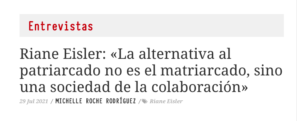
Michelle Roche Rodriguez interviewed Riane Eisler for Zenda Libros about the newest release of El Cáliz y La Espada. Rodriguez asks Eisler about the history of war, Minoan Civilization, how to promote collaboration, and more.
Read an excerpt below, read the entire article in Spanish or English here.
Rodriguez: ¿Cree que el cambio de una cultura de dominación a una de colaboración es el desafío más importante del presente?
Eisler: Sí, por supuesto. La cultura de la dominación se está agotando y es imperativo que miremos hacia los ejemplos del pasado para saber cómo evolucionar hacia sociedades más colaborativas. Hay quienes ya están haciendo esto ahora. El ecologismo desafía la noción de que los humanos debemos conquistar la naturaleza, por ejemplo. De igual manera, el feminismo desacredita la idea de que la dominación de las mujeres por los hombres es un mandato divino o un imperativo biológico. Si te pones a buscar su origen, la alternativa del compañerismo es tan antigua como la Declaración de los Derechos Humanos a finales del siglo XVIII.
Rodriguez: Do you think that the change from a culture of domination to one of collaboration is the most important challenge of the present?
Eisler: Yes, of course. The culture of domination is wearing thin and it is imperative that we look to past examples to learn how to evolve towards more collaborative societies. There are those who are already doing this now. Environmentalism challenges the notion that we humans must conquer nature, for example. Similarly, feminism debunks the idea that the domination of women by men is divinely mandated or biologically imperative. If you start looking for its origin, the companionship alternative is as old as the Declaration of Human Rights at the end of the 18th century.


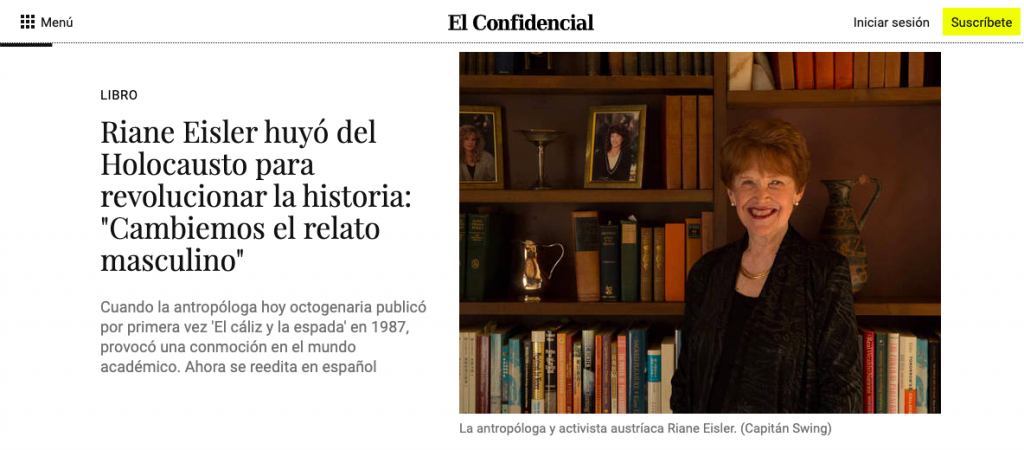
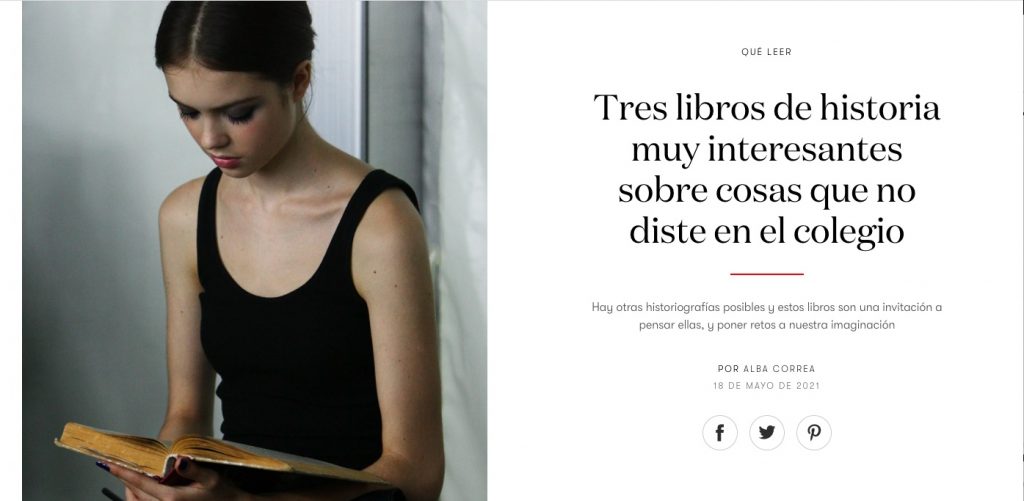

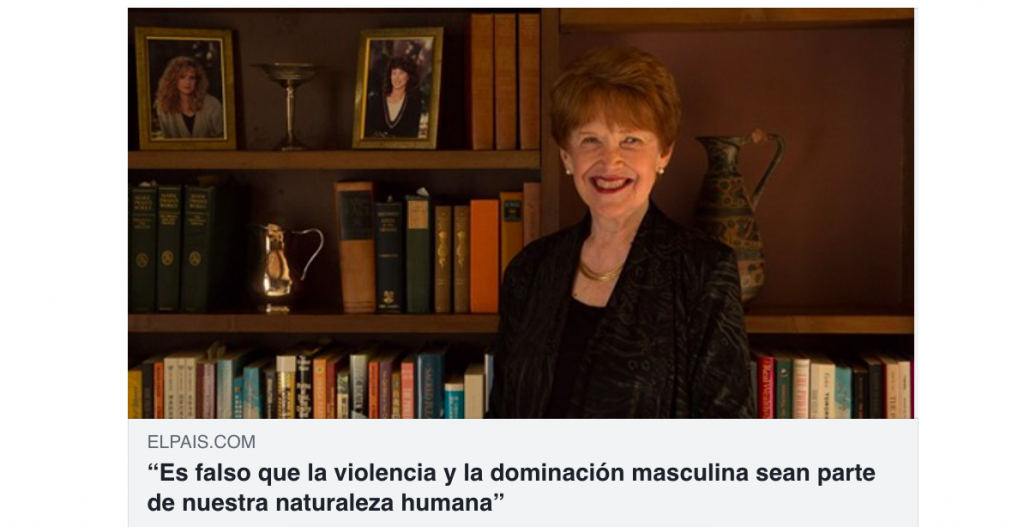

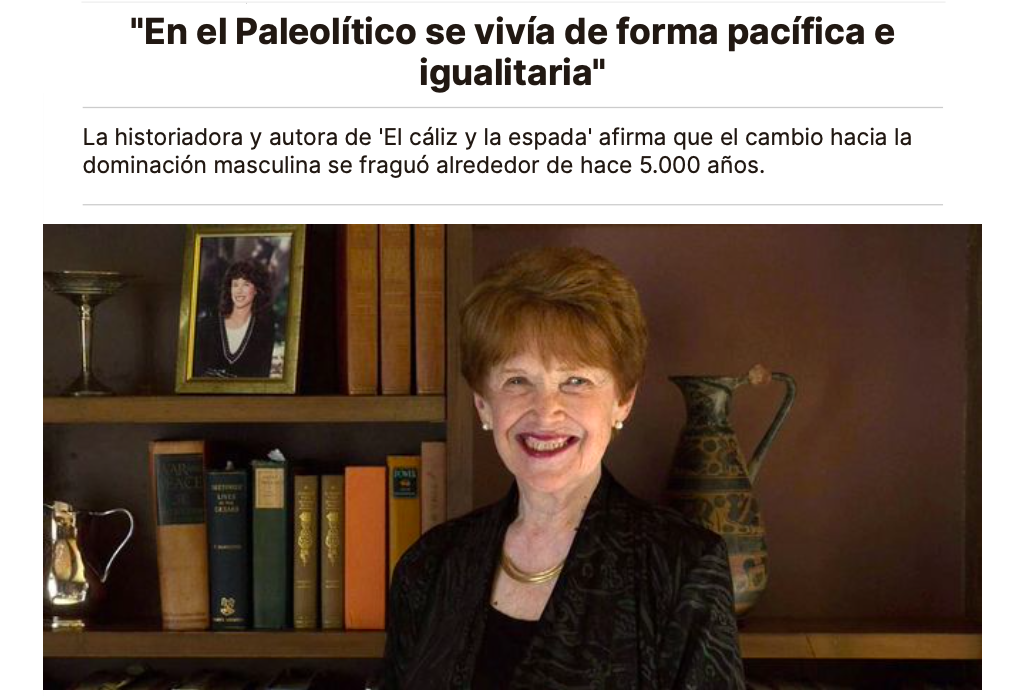
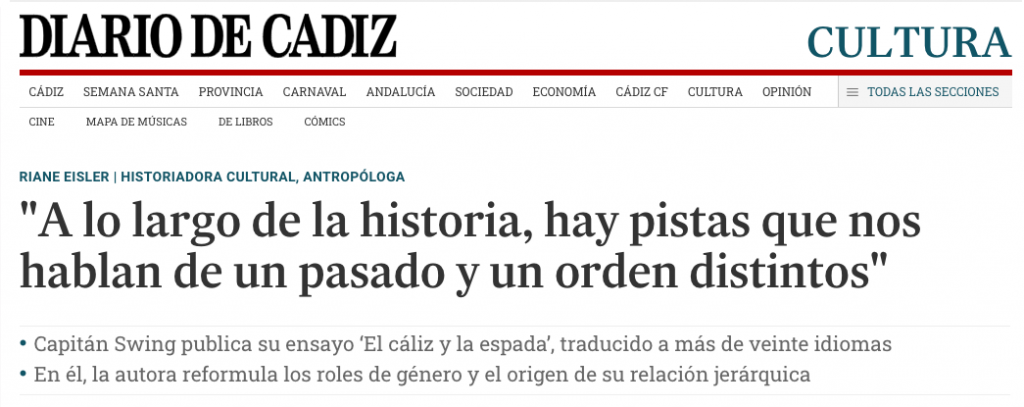
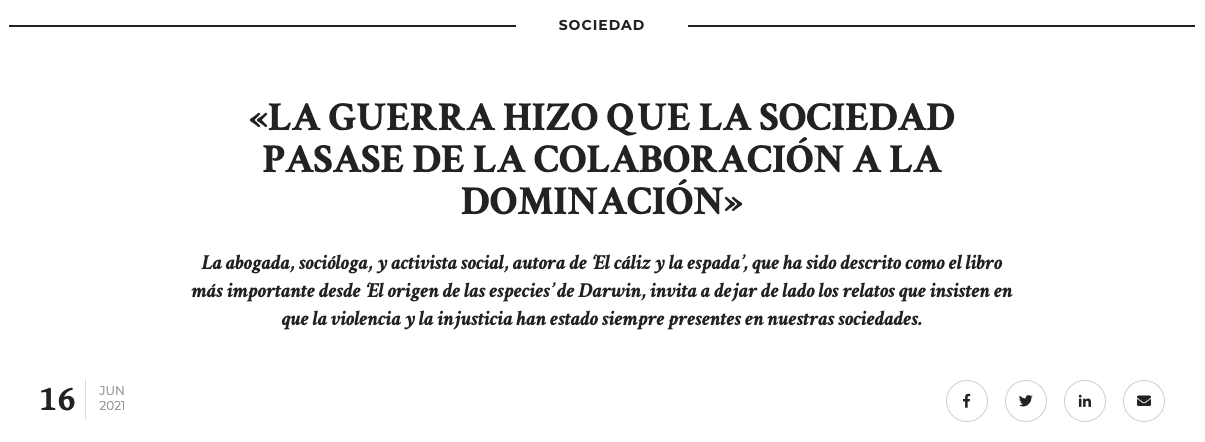
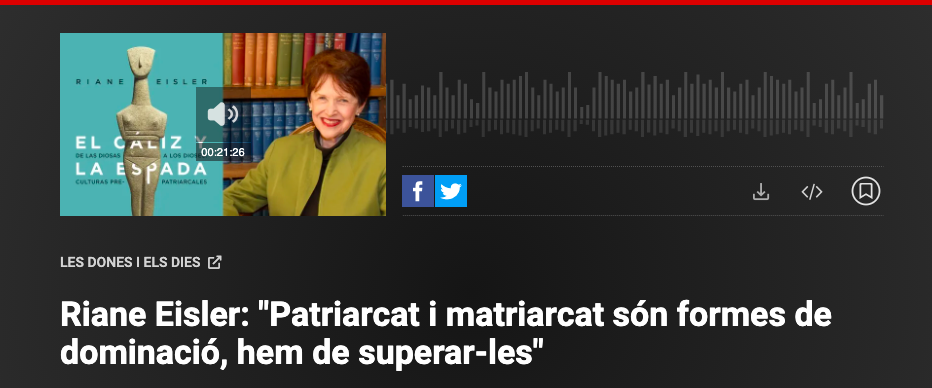

Leave a Reply